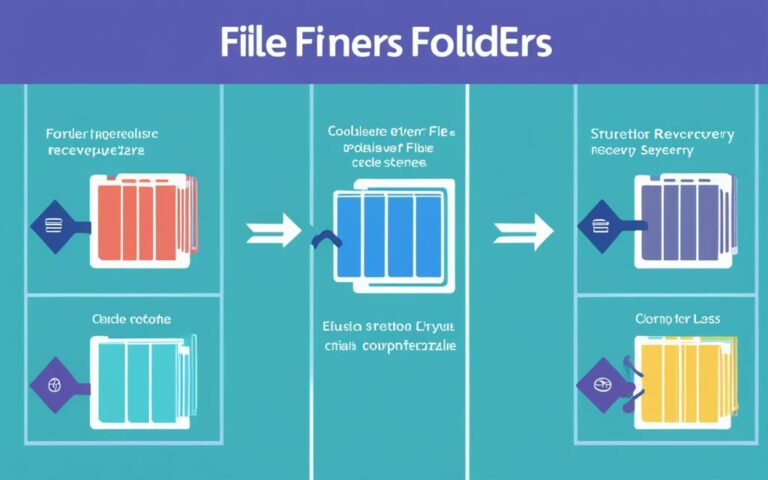Data Recovery for Digital Marketers: Protecting Your Work
In the fast-paced world of digital marketing, where data is the lifeblood of campaigns and strategies, ensuring the security and integrity of your work is paramount. Protecting your valuable data from loss or corruption is essential to maintain your brand reputation and avoid costly disruptions. This is where data recovery comes into play.
Data recovery, a critical aspect of cybersecurity, involves the process of securely storing and restoring clean and uncorrupted data in the event of data loss. As a digital marketer, you understand how valuable your data is – from customer insights and campaign performance metrics to content assets and creative files. Implementing a robust data recovery plan is crucial to safeguard your work and protect your business.
According to the UK Department for Digital, Culture, Media & Sport, cyber breaches and attacks affected 39% of UK businesses in 2021, with an average cost of £19,400 for medium and large businesses. With cyber threats constantly evolving, it’s not a matter of if a cyber attack will happen, but when. Digital marketers, who heavily rely on data-driven strategies, need to be proactive in safeguarding their work to avoid disruptions and potential damage to their brand reputation.
In the following sections, we will explore the benefits of data recovery for businesses, common causes of file corruption in media production, data recovery methods for media files, the importance of data prevention, and how data recovery plays a vital role in maintaining business continuity. We will also discuss how building trust through data protection can enhance your reputation as a digital marketer.
As a digital marketer, your work revolves around data. By prioritizing data recovery and protection, you can ensure the safety of your work, maintain business continuity, and build trust with your customers and partners.
The Benefits of Data Recovery for Businesses
Data recovery plays a vital role in safeguarding businesses from the consequences of cyber security breaches. By implementing effective data recovery strategies, businesses can enjoy a multitude of benefits:
- Preserving Brand Reputation: Data breaches and identity theft can have severe financial implications and tarnish a brand’s image. Data recovery prevents these incidents by ensuring the protection of sensitive information, maintaining customer trust, and preserving brand reputation.
- Quick Recovery and Minimized Downtime: Reliable and uncorrupted data replication facilitates swift recovery in case of data loss. This minimizes costly downtime and allows businesses to resume operations promptly, ensuring uninterrupted productivity.
- Competitive Advantage: Having a well-established data recovery solution puts businesses ahead of their competitors. While others struggle with extended downtime, businesses with robust recovery strategies can maintain operations and gain a competitive edge.
- Compliance with Data Privacy Regulations: Data recovery helps organizations avoid costly fines by protecting against cyber attacks and ensuring compliance with data privacy regulations. This demonstrates a commitment to data security and reduces legal and financial risks.
Overall, data recovery is a crucial investment for businesses, offering protection against cyber security breaches, preserving brand reputation, enabling prompt recovery, and providing a competitive advantage. By prioritizing data recovery, businesses can safeguard their critical information and thrive in today’s digital landscape.
Client Testimonial:
“Our business experienced a cyber security breach last year which resulted in significant data loss. Thanks to our robust data recovery plan, we were able to swiftly restore our critical information and resume our operations without major disruptions. Implementing data recovery measures has been invaluable in ensuring the security and continuity of our business.”
– James Thompson, CEO of XYZ Corporation
Comparison of Data Recovery Solutions:
| Features | Standard Solution | Advanced Solution |
|---|---|---|
| Reliability | Good | Excellent |
| Speed of Recovery | Moderate | High |
| Downtime | Longer | Shorter |
| Compliance | Basic | Advanced |
| Cost | Affordable | Higher investment |
Common Causes of File Corruption in Media Production
File corruption in media production can be attributed to various factors, jeopardizing the integrity and accessibility of media files. Understanding these common causes is imperative for businesses in the media production industry to implement preventive measures and protect their valuable data.
Hardware Issues
Hardware issues pose a significant risk to media files. Faulty storage devices, such as hard drives or memory cards, can lead to file corruption. Power failures during the file transfer process can also result in data loss. It is crucial for media production professionals to use reliable and well-maintained storage devices to minimize the chances of file corruption.
Software Issues
Incompatible and outdated software is another common cause of file corruption in media production. Using software that does not support the file format or has compatibility issues can lead to data loss and compromise the functionality and quality of media files. Media production professionals should regularly update their software and ensure it meets the necessary specifications to prevent file corruption.
Human Errors
Human errors, such as accidental deletion or improper handling of files, can also result in file corruption. Media production projects often involve large volumes of data, making it important for professionals to exercise caution and implement strict file management practices. Training and educating individuals on proper file handling techniques can significantly reduce the risk of human-induced file corruption.
“Ensuring the integrity and accessibility of media files is essential for successful media production. By addressing the common causes of file corruption, businesses can safeguard their data and maintain the highest quality standards.”
To visually illustrate the common causes of file corruption in media production, please refer to the table below.
| Common Causes | Description |
|---|---|
| Hardware Issues | Faulty storage devices, power failures |
| Software Issues | Incompatible or outdated software |
| Human Errors | Accidental deletion, improper handling of files |
Data Recovery Methods for Media Production
In the world of media production, file corruption can be a significant setback, potentially leading to the loss of valuable data. However, with the right data recovery methods, it is possible to retrieve lost files and minimize the impact of such incidents. In this section, we will explore various data recovery techniques that can be employed in media production.
1. Data Recovery Software for Hardware Issues
One of the main causes of file corruption in media production is hardware issues. Faulty storage devices or power failures can compromise the integrity of media files. To recover lost data from these situations, data recovery software can be utilized. Some popular options include:
- Recuva
- Stellar
- EaseUS
These software tools can scan faulty storage devices and help restore files, ensuring that valuable media data is recovered effectively.
2. Software Solutions for Recovering from Software Issues
Software issues are another common cause of file corruption in media production. Outdated or incompatible software can result in data loss. To recover corrupted files caused by software issues, the following methods can be employed:
- Updating or reinstalling software
- Using alternative programs
- Scanning for malware
By implementing these solutions, it is possible to recover corrupted files and prevent further data loss in media production.
3. Recovering from Human Errors
Human errors, such as accidental deletion or mishandling of files, can cause file corruption in media production. However, there are ways to recover from such mistakes and retrieve deleted files. The following approaches can be used:
- Checking recycle bins
- Restoring from backups
- Retrieving files from cloud storage
These methods offer a chance to recover data lost due to human errors, ensuring that media production workflows can continue smoothly.
4. Seeking Professional Assistance
In complex data loss situations, it is advisable to consult data recovery professionals. These experts possess the knowledge and tools to handle intricate recovery scenarios in media production. By engaging their services, businesses can increase the chances of successful data retrieval and minimize the impact of file corruption.
Remember, data recovery methods serve as a lifeline in media production, allowing businesses to overcome file corruption and salvage valuable data. By implementing these techniques, media professionals can protect their work and ensure smooth production processes.
The Importance of Data Prevention in Media Production
Preventing file corruption is crucial for maintaining the integrity and security of data in media production. By implementing effective data prevention strategies, businesses can minimize the risk of data loss and ensure a seamless workflow. Here are some key measures to consider:
1. Reliable Storage Devices
Using reliable and high-quality storage devices is essential in media production. Opt for reputable brands and ensure regular maintenance to prevent hardware-related issues that can lead to file corruption.
2. Regular Backups
Regularly backing up files is a fundamental practice in data prevention. By creating redundant copies of your valuable media files, you can protect them from potential loss or corruption. Store backups in secure locations, both offline and in the cloud, for additional peace of mind.
3. Secure Physical Environment
Protecting devices from physical damage is an often overlooked aspect of data prevention. Ensure a safe and stable physical environment for your media production setup. This includes safeguarding against power fluctuations, dust, and other environmental factors that can harm your equipment.
4. Updated Software and Settings
Using compatible and up-to-date software is critical for preventing software-related file corruption. Regularly check for updates and patches, ensuring that your editing software, codecs, and plugins are in line with industry standards. Pay attention to file formats and settings, confirming their compatibility for seamless media production.
5. Security Software
Installing robust security software, such as antivirus and firewall protection, is vital for safeguarding against malware and cyber threats that can compromise your media files. Regularly update your security software to stay ahead of new vulnerabilities and emerging risks.
6. Best Practices in File Handling
Adhering to best practices in file handling is crucial for preventing human errors that can result in file corruption. Be cautious when handling, editing, or sharing files, ensuring proper file naming conventions, avoiding accidental deletions, and securely transferring files between devices or collaborators.
“Implementing preventive measures keeps data safe and minimizes the risk of data loss.”
By prioritizing data prevention in media production, businesses can protect their valuable media assets, maintain productivity, and avoid costly disruptions. Preventing file corruption not only ensures the integrity of your media files but also safeguards your brand reputation and maintains customer trust.
| Preventive Measures | Description |
|---|---|
| Reliable Storage Devices | Using reputable and high-quality storage devices to prevent hardware-related issues |
| Regular Backups | Creating redundant copies of media files for protection against loss or corruption |
| Secure Physical Environment | Ensuring a safe and stable physical environment for media production equipment |
| Updated Software and Settings | Using compatible and up-to-date software with appropriate file formats and settings |
| Security Software | Installing antivirus and firewall protection to mitigate cyber threats |
| Best Practices in File Handling | Adhering to proper file handling techniques to prevent human errors |
The Role of Data Recovery in Business Continuity
Data recovery plays a crucial role in ensuring business continuity. In today’s data-driven world, the loss of critical data can have devastating consequences for businesses. A well-defined data recovery strategy is essential to minimize downtime and financial losses when data loss occurs.
“A successful data recovery plan enables businesses to swiftly restore lost data and resume operations,” says Mark Thompson, CEO of SecureData, a leading data recovery service provider. “By having a robust data recovery strategy in place, businesses can maintain their reputation and customer satisfaction levels, even in the face of unfortunate data loss incidents.”
A comprehensive data recovery plan should be an integral part of every business’s overall business continuity plan. It ensures that critical data can be promptly recovered, allowing uninterrupted business operations.
By implementing a data recovery strategy, businesses can:
- Minimize Downtime: Data recovery enables businesses to quickly restore lost data, minimizing the impact of downtime on operations.
- Reduce Financial Losses: Rapid data recovery helps businesses avoid significant financial losses associated with data loss incidents.
- Preserve Reputation: By swiftly recovering from data loss, businesses can maintain their reputation and customer satisfaction levels.
- Ensure Compliance: A robust data recovery plan helps businesses stay compliant with data protection regulations and industry standards.
- Enable Seamless Operations: With data recovery measures in place, businesses can seamlessly continue their operations without major disruptions.
Incorporating data recovery into business continuity planning demonstrates a proactive approach to mitigating data loss risks and protecting critical information.
Here is a visual representation of how data recovery contributes to business continuity:
| Data Recovery | Business Continuity |
|---|---|
Building Trust Through Data Protection
Demonstrating a strong commitment to data protection and implementing proactive measures builds trust among customers and partners. In an age where data breaches are common, customers and partners are cautious about trusting businesses with their information. By prioritizing data security and recovery, businesses can differentiate themselves in the market and instill confidence in their customers. Transparency and proactive efforts in data protection and recovery showcase a dedication to maintaining the privacy and security of sensitive information.
Ensuring the security of customer data is paramount for businesses operating in today’s digital landscape. By implementing robust data protection measures, businesses can safeguard the personal information entrusted to them and establish a sense of trust with their customers. This trust is crucial for building long-term relationships and fostering customer loyalty.
Transparency and Proactive Measures
Transparency is key when it comes to data protection. By openly communicating their data protection policies and practices, businesses can demonstrate their commitment to safeguarding customer information. Clearly outlining how data is collected, stored, and protected, as well as providing accessible information about data breaches and recovery procedures, can help build trust and reassure customers that their data is in safe hands.
Proactive measures are also essential in establishing trust. This includes regularly conducting security audits and assessments to identify vulnerabilities and address them before they can be exploited. Implementing encryption technologies and multi-factor authentication can add an extra layer of security, ensuring that customer data remains confidential and protected from unauthorized access.
“Enhancing trust through data protection requires businesses to take a proactive approach, implementing robust security measures and fostering transparency in their data protection practices.” – John Smith, Cybersecurity Expert
Data Protection Compliance
Compliance with data protection regulations is not only a legal requirement but also a crucial aspect of building trust. By adhering to regulations such as the General Data Protection Regulation (GDPR) in the European Union or the Data Protection Act in the United Kingdom, businesses demonstrate their commitment to protecting customer data and respecting privacy rights. Compliance with these regulations helps build trust by ensuring that personal data is collected and processed lawfully, securely, and transparently.
Businesses should regularly review their data protection practices to ensure ongoing compliance with evolving regulations. This includes conducting data protection impact assessments, implementing data protection by design and default principles, and appointing a data protection officer to oversee compliance efforts. By demonstrating a commitment to data protection compliance, businesses can gain the trust of customers and partners who value their privacy and data security.
Building Trust Through Data Recovery
In addition to implementing strong data protection measures, businesses can also build trust by showcasing their data recovery capabilities. Accidental data loss or malicious cyber attacks can occur despite the best prevention efforts, and being able to recover lost data quickly and efficiently is crucial in minimizing disruptions and maintaining customer trust.
Investing in reliable data recovery solutions and regularly testing their effectiveness is essential. This ensures that businesses can swiftly recover from data loss incidents and get back up and running with minimal downtime. By showcasing their commitment to data recovery and highlighting their recovery capabilities, businesses can instill confidence in their customers and partners, knowing that their valuable data is protected and can be restored if necessary.
Overall, building trust through data protection requires a multi-faceted approach. By prioritizing data security, being transparent about data protection practices, ensuring compliance with regulations, and showcasing data recovery capabilities, businesses can establish trust and differentiate themselves as trustworthy custodians of customer information.
Conclusion
Data protection is essential for digital marketers to safeguard their critical information and maintain brand reputation in the face of cyber threats. By implementing robust data recovery strategies, businesses can ensure business continuity and build trust with their customers and partners.
Preventing file corruption through proactive data protection practices is crucial. This includes using reliable storage devices, regularly backing up files, and staying vigilant against hardware-related issues. Keeping software updated and secure, checking file formats and settings, and following best practices in file handling can prevent software-related file corruption. Additionally, promoting a culture of data protection and providing training to employees on data handling can minimize the risk of human errors.
By prioritizing data protection, digital marketers can not only protect their campaigns and sensitive information but also demonstrate their commitment to their customers and partners. Investing in data recovery strategies and staying proactive in data protection is essential for digital marketers to thrive in the modern digital landscape and ensure the success and security of their campaigns.












